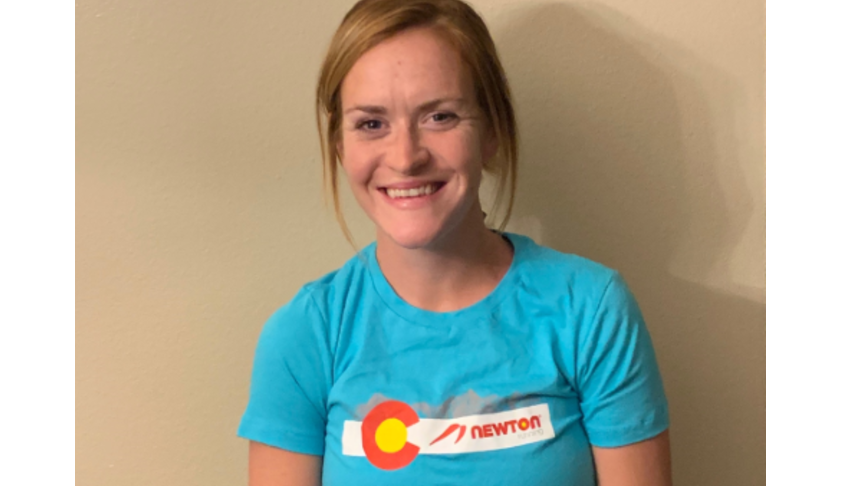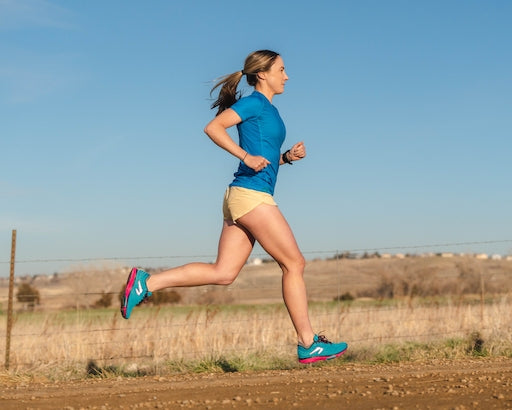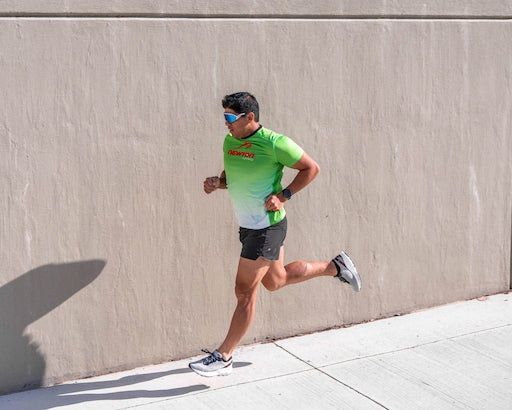
A Pro's Guide to Marathon Fueling
27 September 2019
By: Rosie Edwards; Sports Research Analyst & Professional Marathoner
The marathon grind is real. The early mornings, long workouts and countless miles is the engine that drives an athlete from start to finish line! The focus of our training plans is unwavering but how is our attention to detail regarding our fueling?
My name is Rosie Edwards and I am a professional marathoner from Great Britain alongside working in Boulder, Colorado at LEOMO’s performance center.
Recently, I had a fascinating conversation with a professional cycling coach. I was primarily trying to learn about the elite cycling world and their training. He emphasized that attention to recovery was paramount compared to the training itself.
I intuitively knew that nutrition and hydration are vital for not only competition but for recovering for the next training session. Training at its simplest is stress, response, and adaptation. Helping this process along through fueling allows athletes to respond to the cumulative effects of training.
Carbohydrate is energy for our working muscles while it also assists in fat metabolism. In addition, glucose is the primary fuel for the brain. If the brain is glycogen depleted then this can lead to physical (decreased force production, increased soreness, increased muscle weakness) and cognitive impairment.
Picture the last 10 km of a marathon when it is “go” time. If your cognitive function is impaired and your glycogen stores are depleted, responding to your competition's moves and staying engaged will certainly become a challenge.
How does fueling look for me?
Before the race and during training:
I aim for 7-10 g of carbohydrate/kg/day. I lean towards low glycemic (slow release) carbohydrates including whole grains, fruits, vegetables, sweet potatoes, and lots of oats. Low GI is my preferred choice for preparation to avoid sending my insulin levels through the roof. However, on race day or during training high GI is preferred for fast energy.
On my heavier training days where the marathon workouts are longer and I have a gym session, I will be on the upper end in order to enhance recovery. On a lighter day that does not precede a hard workout I will aim for 7 g/kg alongside 1-1.6g/kg of protein and healthy fats.
In addition to the necessary muscle recovery when training at altitude, protein is especially important as it aids in the formation of red blood cells. Boulder is at 5200 ft and therefore should be taken into consideration. However, if training at higher elevations for a prolonged period of time or for Sunday long runs 2g/kg per day may be beneficial.
Pre-race my routine does not alter too much. I will try to ingest the upper limit of carbohydrates. Before a race, I like to take some of this in the form of a fruit juice or sports drinks rather than heavy carbohydrate-dense foods. I always keep a protein and healthy fat included the night before. Race morning is simple: oats and honey.
I have been lucky enough to work with Nuun Hydration for the last 18 months. This has been a game-changer. I hyper-hydrate 2 hours prior to my marathon by drinking 2-3 tabs in 20fl Oz of water to ensure that my electrolytes are topped up before the start. Hyper-hydration is not something I would practice daily but before a particularly hot or long workout, I will.
When deciding how many carbohydrates to take in during the race I used a breath analysis test at LEOMO to measure carbohydrate oxidation. This occurs when we burn carbohydrate for fuel. Here is a picture of me looking fantastic before the test:
During the race, I take 48 g of carbohydrates per hour in the form of Nuun Endurance which I mix with 24 oz of water. I aim for every 5 km or as the bottles are provided. This setup provides me with a perfect blend of fast-release energy and hydration in addition to topping up my electrolytes in order to eliminate the risk of cramps. I make sure to practice every new fueling strategy in each marathon buildup. Our team is notorious for placing random tables around the Boulder reservoir to practice our bottle pick up and fueling. Sorry if we’ve ever blocked your car!
After the race:
Ahhh! The time we can enjoy all the foods we have been missing.
Personally, I struggle for many hours after a race or hard session to ingest solid food so I always opt for a smoothie. I blend 25 g of protein powder, almond milk, spinach, frozen berries, and a banana and aim to drink it as quickly as I can. Adding a frozen component can help to decrease your core temperature and aid recovery. This provides me with 50 g of carbohydrate and 25 g of protein (2:1 ratio) immediately. I then aim to eat a good source of antioxidants, fat, and protein to decrease inflammation within an hour. Avocado, spinach, and eggs on toast was made for this.
In addition to quantity, the most important piece is figuring out which fuel will elicit the best response from your body. More carbohydrates can be absorbed when glucose and fructose are ingested together because they are absorbed via different routes in the intestine. However, some people have difficulty absorbing fructose. Like many ingredients in a sports drink fructose is a simple sugar known as a monosaccharide. However, if the cells on the surface of your intestines are unable to break down the fructose efficiently malabsorption occurs. Not only will your body struggle to absorb it efficiently, but you may also experience the dreaded “tempo tummy”. Nausea and headaches can also ensue. Surprisingly it affects 1 in 3 people.
If you have experienced any of these issues during training or racing it may be advisable to try some products which do not contain sucrose. Nuun Endurance is a non-fructose based equivalent. It’s very much a case of trial and error but beginning an informed self-study from day one of your build-up will give you the best shot of reaching the finish line feeling great.
For more info on performance testing, please don’t hesitate to reach out: rosie.edwards@leomo.io Happy fueling!


